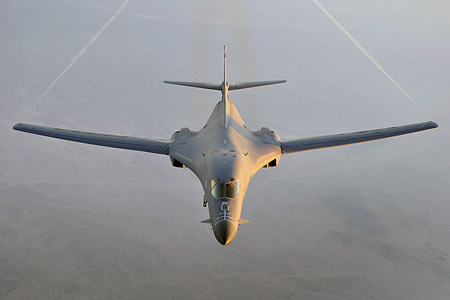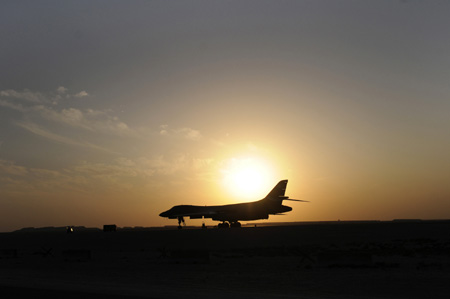Boeing Honors 25 Years of B-1 Excellence







 DYESS AIR FORCE BASE, Texas, April 29, 2010 -- Members of the Boeing [NYSE: BA] B-1 Bomber Program team have joined the U.S. Air Force at Dyess Air Force Base today to mark the 25th anniversary of the B-1 bomber.
DYESS AIR FORCE BASE, Texas, April 29, 2010 -- Members of the Boeing [NYSE: BA] B-1 Bomber Program team have joined the U.S. Air Force at Dyess Air Force Base today to mark the 25th anniversary of the B-1 bomber.
The B-1 has supported U.S. and allied warfighters around the world since it entered active service on June 29, 1985.
"The 25th anniversary of the B-1 brings back many memories of its service from the Cold War through today," said Boeing B-1 Program Manager Mark Angelo. "I remember when the first operational B-1B rolled out of Palmdale [California] in 1985, culminating an intense production effort that began soon after President Ronald Reagan took office in 1981."
Boeing's contributions to the program since Rockwell International delivered the first B-1 to Dyess include:
- Producing 99 additional B-1s at a rate of one per month. The 100th B-1B rolled out at the Palmdale facility on Jan. 20, 1988. It was delivered to McConnell Air Force Base, Kan., on May 2, 1988.
- Supporting the initial deployment and fielding of the aircraft at Dyess; McConnell; Ellsworth Air Force Base, S.D.; and Grand Forks Air Force Base, N.D.
- Supporting the transition of the B-1 from a nuclear role with the Conventional Mission Upgrade Program from 1993 to 2005, which enabled the aircraft to use precision-guided conventional weapons.
- Supporting the stand-up of B-1s in the Kansas and Georgia Air National Guards.
- Supporting the B-1s in the "Composite Wing" at Mountain Home Air Force Base, Idaho.
- Adding Beyond Line-of-Sight Radio capability to deployed aircraft in support of Operation Allied Force, Kosovo in 1999.
- Integrating the Lockheed Electro Optical Targeting Pod to B-1s deployed to Southwest Asia in support of Operation Iraqi Freedom and Operation Enduring Freedom, which significantly increased the types and numbers of missions that can be flown to support ground troops.
The B-1 serves as the supersonic component of the Air Force's long-range bomber dominance. Its swept-wing geometry allows the B-1 to travel at higher speeds and deliver more ordnance in a shorter amount of time than other platforms.
"Our Boeing team is proud of the heritage and the effective use of the B-1 for national security every day," said Angelo. "We congratulate the men and women of the Air Force on the first 25 years of B-1 operations, and we will continue to work with them to modernize the B-1 and maintain its profound combat advantage in support of the Air Force mission for decades to come."
Source: BOEING








